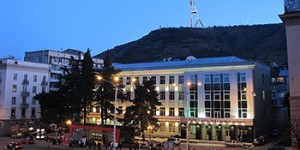When Rusudan, a 47-year-old woman from Georgia’s western city of Zugdidi, decided to move her son from a public school to a private school seven years ago, it was not a light-hearted decision. Like many of her generation, she favors public education. Yet, despite nearly a decade of reforms, public schools in Georgia are falling short.
“The conditions were simply not good enough,” Rusudan, who asked that her surname not be printed, said about her choice to move her kids out of the local public school. “The school was decaying, classes were cramped, and teachers were stuck in Soviet-style methods. There was no interaction, students were ‘taught at’ as a single entity, with no consideration of the individual specifics.”
Despite a bevy of reforms since 2005, the quality of Georgia’s education system ranked 98th out of 144 countries surveyed, according to a 2014 ranking compiled by the World Economic Forum, a Geneva-based non-governmental organization.
In 2010, only 38 percent of 4,782 15-year-old Georgian students who took the Organisation for Economic Cooperation and Development’s Programme for International Student Assessment (PISA) proved to be proficient readers. In math, Georgia scored the second lowest out of 65 countries (after Kyrgyzstan), with 40 percent of its students below the baseline.
The sample was made up overwhelmingly of public-school students. Georgia has performed better in other international tests, but still tends to rank below average.
Increasingly, to give their children the education they need to compete in a global economy, Georgian parents of means are abandoning public schools. Enrollment in private schools skyrocketed by 367 percent to 56,756 students from the 2000-2001 to 2011-2012 school years, according to official data.
No standardized assessment of these private schools’ quality has been performed, but a 2013 UNICEF analysis showed that, when comparing test scores by school type, a marked difference exists between students from public and private schools in Georgia, especially when it comes to reading. In addition, private schools tend to emphasize foreign languages, particularly English.
With average monthly salaries at only $407 (712.5 laris), many Georgians cannot afford the average 1,500 laris ($858) per child that parents like Rusudan, a non-profit employee, pay in yearly tuition to a private school.
“The inequality is obvious and worrying,” commented Tamuna Mosiashvili, a former teacher and Education Ministry official who is now an education program manager at the Civic Development Institute, a nongovernmental organization, in the capital, Tbilisi.
“Essentially, if a family has no money, the child has no future,” Mosiashvili added. “The quality [of public schools] is so low that most families have to hire a tutor at home in order to pass [university-entrance] exams, but poor families simply cannot afford them.”
Out of her monthly salary of 1,100 laris ($629), Irina Kemoklidze, the only breadwinner in an all-female household in Tbilisi, paid 590 laris ($337) per month for her niece to receive private tutoring in five subjects for Georgia’s university entrance exams. Prices vary depending on the subject, teacher, and number of sessions. Thrice-weekly tutoring in English or math by a university instructor can run as high as 200 laris ($114), she added.
Students outside of Tbilisi, which contains nearly half of the country’s 244 private schools, have far fewer educational opportunities.
“Income inequality in Georgia has a very strong regional dimension; the vast majority of the poor are rural dwellers for whom private schooling or tutoring are completely out of reach,” commented Tbilisi State University’s International School of Economics (ISET) Executive Director Eric Livny, who has researched socio-economic disparities in Georgia’s public educational system.
Livny estimates that “about 9 percent of Georgia’s youth, the country’s future elite,” study in private schools.
The result, he wrote in a recent ISET blog item, is “a division into social classes that go to different schools and speak different languages.”
Deputy Education Minister Giorgi Sharvashidze maintains that the government is working to close the gap between town and country. Low school attendance in rural and mountainous areas of Georgia contributes to students’ poor performance in tests like PISA, he said. To tackle the issue, the government has started issuing free textbooks to students and launched a school-bus program that serves about 1,000 schools in remote areas.
As a result, since 2012, “school attendance has increased from 60 to 95 percent,” Sharvashidze emphasized, adding that the two programs have helped cut families’ out-of-pocket expenses for education. “I am sure that when we sit for PISA again, in 2015, Georgia will perform better,” Sharvashidze said.
At about 3 percent of Georgia’s 2013 Gross Domestic Product of $16.13 billion, government spending on education remains low compared with countries with a similar per-capita income, the World Bank reported earlier this year. Salaries account for 70 percent of that budget; a figure that leaves little room for spending on training, curriculum or investment in infrastructure. The comparatively low spending levels also do little to address socio-economic imbalances in the education-system. Rather, it contributes to Georgia’s economic woes, some observers contend.
“Education has become a key economic problem,” stated Sascha Graumann, UNICEF’s representative in Georgia. The “significant” official economic growth rates of the past decade (reaching a high of 7.2 percent in 2011) did not bring jobs with them, he added. “And the key reason for that can probably be found in the lack of investment and efficiency in the education-sector.”
Monica Ellena is a Tbilisi-based freelance journalist, who has worked previously as an elementary school teacher in Italy and a university instructor in Georgia.
Tags: Policy, Research & quality

